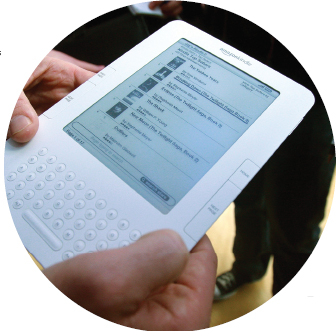Tracking Technology
TRACKING TECHNOLOGY
Free Textbooks? Easier Said Than Done
by Alisha Azevedo
Providing college students with free textbooks is no easy task. That seems to be the major lesson from several efforts to produce e-books that are low-cost or free to help reduce students’ costs. Money pressures, slow adoption by professors, and quality concerns stand in the way.
Take Flat World Knowledge Inc., an upstart publisher that had been a key proponent of a so-called freemium model of giving away electronic copies of textbooks and asking students to pay for extras like flash cards or printed copies. The company announced a sudden move away from that model in November [2012], stating that its free-content option will no longer be available. The reason for the change: Students weren’t buying as many printed copies as predicted because those who wanted one got a used copy, said Jeff Shelstad, one of the company’s founders. Flat World will still offer textbooks at lower prices than traditional publishers do, he added, but nothing will be free. Some see Flat World Knowledge’s move away from the freemium model as a warning for other open-access textbook projects.
Finding ways to support the production of free textbooks is not the only unresolved issue for open-textbook proponents. Another challenge is getting buy-in from instructors, who must be persuaded to adopt the textbooks. And when books are written by volunteers, keeping quality high can be more difficult than in the traditional model, where authors are paid by publishers.
Producing free textbooks may sound like a good idea, but it’s turning out to be easier said than done. “It’s like the college library,” said Tim Tirrell, director of partnerships and strategic planning for Merlot, a free online resource for college learning materials supported chiefly by the California State University system. “Everybody agrees that it should be there—it should be free to access and free to everyone. But somewhere behind the scenes, you need a sustainable business model and partners.”
Several colleges and universities have used the backing of nonprofit groups like the Bill & Melinda Gates Foundation to support their free-textbook projects. The projects usually provide free texts online and charge a small fee for print to bring in some revenue. Rice University’s OpenStax College, for example, has published two textbooks this year and is developing three more with money from four different foundations. OpenStax is also trying to expand outside its traditional audience. The iPad version of its physics textbooks, released in December on iTunes for $4.99, could win sales from people who aren’t even taking a course, said Richard Baraniuk, director of the project and professor of electrical and computer engineering at Rice University.
Mr. Baraniuk worries that some free-textbook projects are not thinking enough about long-term financial stability and quality. “Too many projects are just focused on sort of informal sharing of material by instructors, which is great, but is not necessarily sustainable,” he said. “There hasn’t been enough focus on generating content which is truly high quality, that can stand on its own and compete in a world marketplace and be free.”
But since producing the textbooks is so expensive, some proponents argue that aggregating free online content is a more-realistic method than building their own texts for some projects. One example of that approach is the Open Textbook Catalog at the University of Minnesota’s College of Education and Human Development. Such aggregation is far cheaper than publishing, said David Ernst, director of academic and information technology for the college.

Instructors can adopt free digital textbooks from the catalog or buy the printed versions. The college offers a stipend to faculty members who peer-review the texts, and over half of the professors who review the open-source books adopt them later, Mr. Ernst said. “One of the barriers to faculty adoption is that they don’t know where to find them,” he added. “Even if they are interested, they just don’t know where to go.”
Source: Excerpted from Alisha Azevedo, “Pay Nothing? Easier Said Than Done,” Chronicle of Higher Education, January 27, 2013, chronicle.com/article/Can-Textbooks-Ever-Really-Be/136833/.